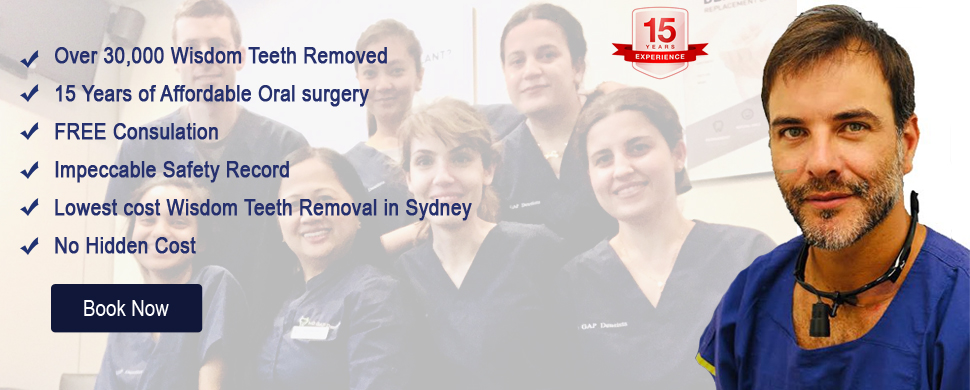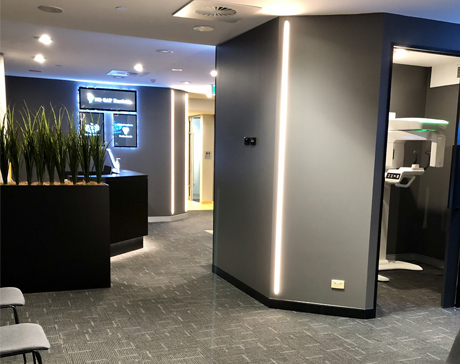Click HERE to see wisdom teeth removal photos...
The Wisdom tooth, or Wisdom teeth ( also called Third Molars ) usually do not push through the gums until the late teens or twenties. Wisdom teeth are usually the last teeth to come through the gums.
Complications
In the majority of cases, there will not be enough room in the jaw for a wisdom tooth or all wisdom teeth to fully emerge. This can lead to several complications. If the exit of the wisdom teeth is stalled at the halfway point (soft impaction), this can make brushing and flossing the wisdom teeth extremely difficult. Food and bacteria builds up between the wisdom teeth and its neighbouring molars, and decay and gum infection are very likely to occur. Crowded wisdom teeth in the upper jaw have a tendency to lean sideways and grate against the cheek. These wisdom teeth usually cause ulceration and chewing problems. A further problem is wisdom teeth crowding- the pressure from wisdom teeth may also force the other teeth closer together, and interfere with the bite. Gum disease and cyst formations are also complications of impacted wisdom teeth. Very rarely, tumours may also form from the wisdom teeth. Pressure from the wisdom teeth can also cause toothache on the tooth next to it. Ulceration can also be caused by wisdom teeth. Upper wisdom teeth may push sideways out of the gum and cause ulcers inside of the cheek.
Antibiotics are a short term solution for impacted wisdom teeth
Mouth infections such as pericoronitis caused by wisdom teeth can be treated with antibiotics, but the infection will reocurr unless the wisdom teeth removal is performed. People with pre-existing health problems can suffer serious complications from these wisdom teeth infections.
Wisdom teeth removal surgery is best done early
Toothache prompts patients to come to the dentist. However, wisdom teeth do not usually cause pain until damage has already been done! Getting wisdom teeth out, wisdom teeth removal surgery or as some say wisdom removal is best performed sooner rather than later. Age is one of the most important aspects when it comes to risks and post-operatory recovery from surgeries involving impacted wisdom teeth removal. The roots of wisdom teeth in a teenager are still forming, making the wisdom teeth removal easier and safer. Later in life the roots of wisdom teeth are completely formed and embedded firmly in the jaw. X-rays taken earlier can indicate whether or not wisdom teeth will cause problems. The dental surgeon or oral surgeon will tell you when is the best time for the wisdom teeth removal.
Procedure, pre surgical consultation and review of wisdom teeth removal
During a consultation involving x-rays or OPG (panoramic x-ray) and examination, the dental surgeon or the oral surgeon can determine which wisdom teeth or wisdom tooth will be, or are, functional, and which ones need to be removed. In many cases all four wisdom teeth will need to be removed. The wisdom teeth pre-surgical consultation is very important, and at Wisdom Dental Emergency Melbourne and Sydney, this consultation is most of the time performed by Dr Pinho. Aside from the examination and the decision on whether to operate or not, the consultation also allows the patient to establish a comfort level with the dental surgeon and some of the other members of the team. The wisdom teeth removal commonly involves an incision to open the gum, and sometimes a small portion of the bone may need to be removed to provide access for the wisdom teeth removal. The wisdom teeth may also need to be divided into segments so it can be removed safely and easily. Perfect wisdom teeth technique and a lot of experience is a must for these surgical procedures. The incision in the gum may then need to be closed with stiches (these are dissolvable in our practice). The patient is always well monitored during the wisdom teeth removal surgery, and a set of instructions are given and discussed for the post-operation recovery period. Dr Pinho always phones every patient a couple of days after every wisdom teeth removal surgery and also reviews the patient around 1 week after the procedure totally free of charge.
Panoramic X-Ray (OPG)
An OPG or panoramic X-Ray is very important if not essential during the consultation of wisdom teeth removal. This X-ray not only shows all the patient s teeth but also shows the Inferior alveolar nerve and its proximity to the lower wisdom teeth. The OPG X-Ray also shows the sinus around the upper teeth and helps assessing risks of an oral antral communication. With this X-Ray the surgeon is able to evaluate all 4 wisdom teeth and all nobel structures around it with 1 single film. This same X-Ray can also be used for an overall examination of all other teeth by another dentist in case further treatment is required. The OPG X-Ray in an invaluable tool during the assesment of Wisdom Teeth and all remaining dentition. The OPG X-Ray also provides a financial benefit for the patient if more than 1 tooth is required to be removed.
General or Local Anaesthesia
The option of which anaesthesia to use during the wisdom teeth removal surgery will be discussed during the pre-consultation in one of our clinics in Melbourne or Sydney. The level of surgical difficulty, tooth impaction and the patient's anxiety level are all taken into consideration. All general anaesthesia operations are performed at Hospitals in Melbourne and Sydney perfectly equipped for wisdom teeth removal and difficult tooth extraction.
The decision to have wisdom teeth removal is always the patients decision. If you have any questions regarding the treatment please ask one of our professionals.
Traveling to foreign places and the wisdom teeth
Wisdom teeth removal may be advisable before traveling to an area or country where dental services like wisdom teeth surgery are not readly available
Orthodontics and wisdom teeth
Many orthodontists believe that developing wisdom teeth can cause the front teeth to become over crowded, and often recommend wisdom teeth removal before or immediatelly after orthodontic treatment
Wisdom teeth removal for prosthetic reasons
Wisdom teeth removal surgery or impacted tooth extraction may need to be considered before construction of dentures. Sometimes the wisdom teeth erupt beneath the denture and that can cause severe irritation and infection
Wisdom teeth removal surgery when acute infection is present
Generally speaking, wisdom teeth removal should be delayed in the presence of infection. Most of the time is preferable to control the infection with antibiotics and oral higiene first. The tooth extraction of the opposing wisdom tooth is also sometimes adviced but that needs to be decided during the consultation with the dental surgeon or the oral surgeon.
Asymptomatic impacted wisdom teeth
There is always a risk that impacted wisdom teeth may cause problems. it may occur at inconvenient and unpredictable times. If the wisdom teeth appear to have a high chance of causing problems in the future, the dental surgeon and the oral surgeon may advice removal of wisdom teeth
Wisdom teeth X-ray
The most used radiograph to assess wisdom teeth is called OPG. This x-ray is most often required to show the end of the roots of wisdom teeth and its location in relation to important nerves and the sinus. Its advisable to have this x-ray prior to any wisdom teeth removal consultation
Impacted wisdom teeth categories
Impacted wisdom teeth fall into several categories. Mesioangular impaction is the most common and means the wisdom tooth is angled forward, towards the front of the mouth. Vertical impaction means the tooth is angled backwards, towards the rear of the mouth. Horizontal impaction means fully 90 degrees forward. Most of the time wisdom teeth with distoangulation are the easiest to extract in the maxilla and the most difficult in the mandibule. The wisdom teeth with mesioangulation are easier to remove in the mandibule and more difficult in the maxilla
General comment
Wisdom teeth removal surgery is not something people look forward to, but modern surgical and anaesthetic techniques as used at Wisdom Dental Emergency Melbourne and Sydney have now combined to make wisdom teeth removal surgery a much more acceptable procedure than in the past.




